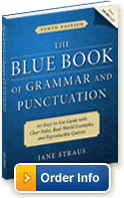|
Welcome to your GrammarBook.com E-Newsletter.

|
"Your newsletter and the GrammarBook.com website make English grammar rules so easy to understand and are so helpful to me as an ESL teacher"
- Martha L.
"I'm your biggest fan! I've just ordered The Blue Book of Grammar and Punctuation and can't wait to see it."
- Guilherme G.
"Your weekly E-Newsletters and GrammarBook.com website have helped people like me be successful in our careers. "
- Michele E.
|
|
|
More Mangled Language and Pompous Usages to Avoid
This column is mostly concerned about the written word, but even so, pronunciation will inevitably enter the picture from time to time.
The expressions chomping at the bit and stomping ground are both corruptions of the original champing and stamping. People find this incredible. But, for instance, consult the 1961 cult-favorite western film One-Eyed Jacks, and you’ll hear Marlon Brando clearly say, “I know all his old stampin’ grounds.” My 1968 Random House dictionary and my 1980 American Heritage dictionary (the one with its own usage panel) don’t even list stomping ground, only stamping. Nor do they list chomping at the bit, only champing.
My 1999 Webster’s lists both, but Webster’s is more permissive by design; it’s what’s called a descriptive dictionary, as opposed to prescriptive ones like American Heritage, which presume, unlike Webster’s, to act as guardians of proper English.
Here are some more words and phrases that make word nerds wince:
Kudos To this great man, kudos are overdue. That’s not a sentence that would raise many eyebrows, but kudos is not the plural of kudo. There’s no such thing as a kudo. Kudos is a Greek word (pronounced KYOO-doss or KOO-doss) meaning praise or glory, and you’d no more say kudos are due than you’d say glory are due. You must change are to is: kudos is overdue. Of course, if you ever said that, everybody’d think you’re strange—everybody but that word nerd skulking in the corner.
Snuck A lot of people these days think this is the legitimate past tense of sneak. A lot of people are wrong. The past tense of sneak is sneaked. Even my Webster’s has a problem with snuck, calling it “informal.”
Flaunt, flout He was a rebel who flaunted the rules. Make that flouted. To flaunt is to display ostentatiously; to flout is to ignore, disregard. Don’t flaunt your ignorance by flouting the correct usage of flout.
Close proximity Also commonly used by a lot of smart folks who should know better. There is a creek in close proximity to the cabin. This is ill-advised for a number of reasons. First, proximity already means “closeness,” so the phrase is redundant: “close closeness.” And this is just an affected way of disdaining nice clear words like near, nearby, et al. What’s wrong with “There’s a creek near the cabin”? Word nerds believe that the fewer words and syllables it takes to get your point across, the better a writer you’ll be.
More importantly, most importantly When grammatical cluelessness combines with a desire to sound glib, we get maddening phrases like these two. I’ve been a pedantic prig, er, copy editor, a long time and I’ve never seen a valid use of more or most importantly. Just drop the -ly and make my day. More important, you’ll be using good English. Most important, you won’t sound like some pseudo-scholarly fusspot.
Impostor, imposter This word helps illustrate my frustration with Webster’s and its “descriptive” approach. Dictionaries like Webster’s don’t exist for that purpose; dictionaries like American Heritage do. Counting the one on my PC, I have eight different dictionaries in my home (what’d you expect?) spanning the period from the 1940s to the present. In not one of the pre-’90s editions is imposter an acceptable alternative spelling of impostor. In fact, one of them defines imposter as a different word altogether (a low-level bureaucrat who determines customs duties). But my 1999 Webster’s and the dictionary on my computer acknowledge both spellings. This is a revoltin’ development; the long-established impostor goes up in smoke, because now people can “look it up in the dictionary” and believe imposter is acceptable.
Well, it isn’t. All Webster’s is doing is noting that a lot of lazy people have started spelling the word with that -er. Webster’s doesn’t judge; it just records changes in the language. Change is good, you say? Sure—sometimes. But imposter is a sign of cirrhosis of the language. It’s change born of ignorance, not evolution.
If enough people make the same mistake, Webster’s feels compelled to acknowledge it, which to word nerds is unimaginably infuriating, especially because people think all dictionaries are the ultimate authority.
This week's grammar tip is by veteran copy editor and word nerd Tom Stern.
Due to the E-Newsletter's large readership, please submit your English usage questions through GrammarBook.com's "Grammar Blog." |
|
Free BONUS Quiz For You!
[[firstname]], because you are a subscriber to the newsletter, you get access to one of the Subscription Members-Only Quizzes. Click here to take a Confusing Words and Homonyms Quiz and get your scores and explanations instantly!

"So convenient...hundreds of quizzes in one click."
[[firstname]], Subscribe to receive hundreds of English usage quizzes not found anywhere else!
- Take the quizzes online or download and copy them.
- Get scored instantly.
- Find explanations for every quiz answer.
- Reproduce the quizzes to your heart's content.
- EASY to use.
- No software to download.
- No setup time.
- A real person to help you if you have any questions!
"Fun to test my skills!" "The explanations really help...thanks!"
Your choice: Subscribe at the $29.95 or $99.95 level ($30 off - regularly $129.95).
"I download the quizzes for my students who don't have computer access."
Subscribe today to receive hundreds of English usage quizzes not found anywhere else!
"Makes learning English FUN!"
 |
Don't need all the quizzes at once?
You can now purchase the same quizzes individually for ONLY 99¢ each. Purchase yours here. |

Get Yours Today!
Get Amazon’s #1 Bestseller in Four Categories!
#1 in Grammar
#1 in Reading
#1 in Lesson Planning
#1 in Vocabulary |
The Blue Book of Grammar
and Punctuation by Jane Straus
An indispensable tool for busy professionals, teachers, students, homeschool families, editors, writers, and proofreaders.
Now available in print AND as an e-Book! Over 2000 copies are purchased every month!
Order Your Copy Today!
- Hundreds of Grammar, Punctuation, Capitalization, and Usage Rules
- Real-World Examples
- Spelling / Vocabulary / Confusing Words
- Quizzes with Answers
|
View the entire contents online
Discounts available for schools, bookstores, and multiple copies. Order Today!
Wordplay 
A thief who stole a calendar got twelve months.
When the smog lifts in Los Angeles, U.C.L.A.
The professor discovered that her theory of earthquakes was on shaky ground.
Learn all about who and whom, affect and effect, subjects and verbs, adjectives and adverbs, commas, semicolons, quotation marks, and much more by just sitting back and enjoying these easy-to-follow lessons. Tell your colleagues (and boss), children, teachers, and friends. Click here to watch. |







